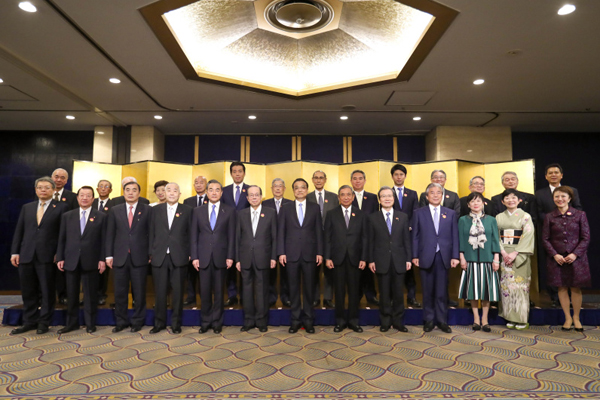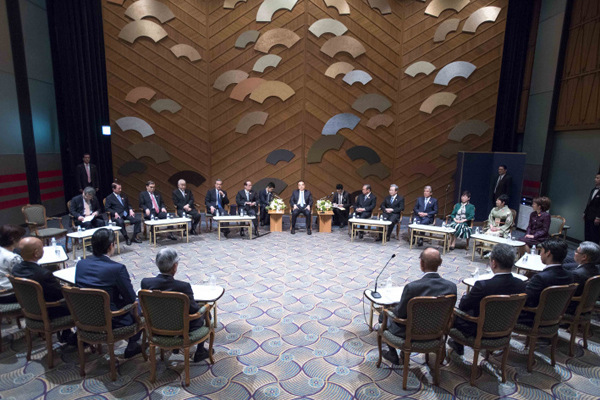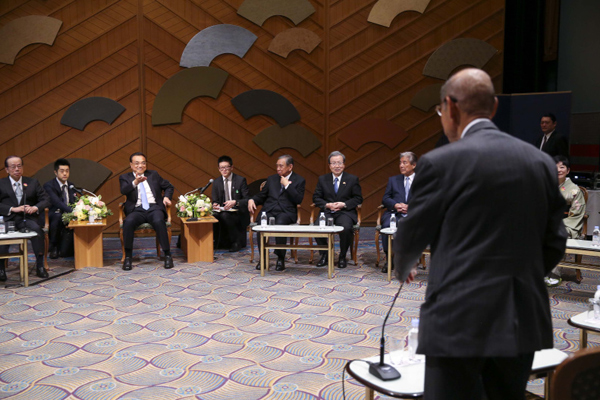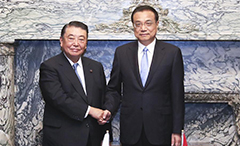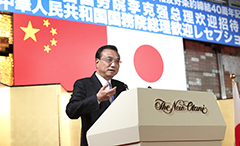Friendship treaty cemented in intergenerational meeting
2018-05-11
english.gov.cn
Premier Li Keqiang met with 21 Japanese representatives involved in the Treaty of Peace and Friendship between China and Japan, and their offspring, in Tokyo on May 10, 2018.
Some of the original participants in the treaty are now gray-haired, the second generation are in their prime, and the third generation are still in their youth.
They came from all over Japan to tell Premier Li about their unforgettable experience in establishing the historic friendship.
Former Japanese Prime Minister Yasuo Fukuda, son of then-Prime Minister Takeo Fukuda, President of the Japanese Association for the Promotion of International Trade Yohei Kono, who is nephew of a former president of the House of Councillors of Japan, Kenzo Kono, also attended.
The year 2018 marks the 40th anniversary of the conclusion of the Treaty of Peace and Friendship between China and Japan. Forty years ago, former Chinese leader Deng Xiaoping and Takeo Fukuda attended the exchanging ceremony of ratification documents of the treaty.
It feels pleasant to recall their contribution to the treaty conclusion, said the Premier.
“Their decision has proved to be far-sighted. It confirms the principles of the 1972 Sino-Japanese Joint Statement in a legal form, and sets the direction of peace and friendship in bilateral ties.”
“Today we are here reviewing the spirit of the treaty to enhance our political foundation and expand cooperation. We should carry on this spirit generation by generation, then the cooperation and people-to-people exchanges will be deepened,” he added.
Yasuo Fukuda expressed his agreement with Premier Li, saying, “I believe each of us present today will live up to this expectation, and the two countries will achieve further progress in bilateral friendship through this opportunity of Premier Li’s visit.”
A former minister of the Japanese embassy in China said his memory of the historical experience remained fresh: “The happiness and excitement in the treaty-making still lingers in my mind.”
Premier Li said, “The treaty-making process was actually not smooth, participants devoted a lot of hard work, courage and wisdom to its realization, to whom I’d like to send my gratitude and respect.”
“Over the past 40 years, although there were setbacks, our relations would always come back to the track of peace and friendship, thanks to the four cornerstone political documents in the friendship treaty,” he said.
The four documents refer to the 1972 Sino-Japanese Joint Statement, the 1978 China-Japan Treaty of Peace and Friendship, the 1998 China-Japan Joint Declaration, and the 2008 joint statement on advancing strategic and mutually beneficial relations.
The four political documents are important consensus reached by the two sides. This visit is meant to firm up the commitment and push for a stable long-term friendship.
“Our friendship not only is in the interests of the two countries, but also the expectation of the international community,” the Premier added.
“It’s significant for us to reunite at this moment,” said Yasuo Fukuda, “but it’s a pity that Premier Li’s visit only lasts three days.”
Premier Li responded that his visit was short but his schedule was full. “As long as China and Japan carry on the treaty’s spirit, I think there will be more frequent communications, whether at the government level or folk level.”
Yohei Kono said the older generation has contributed greatly to the treaty conclusion, so we should also strive for closer ties.
“The treaty is like an iron bridge linking us together; we should build it more solidly,” the Premier added.
